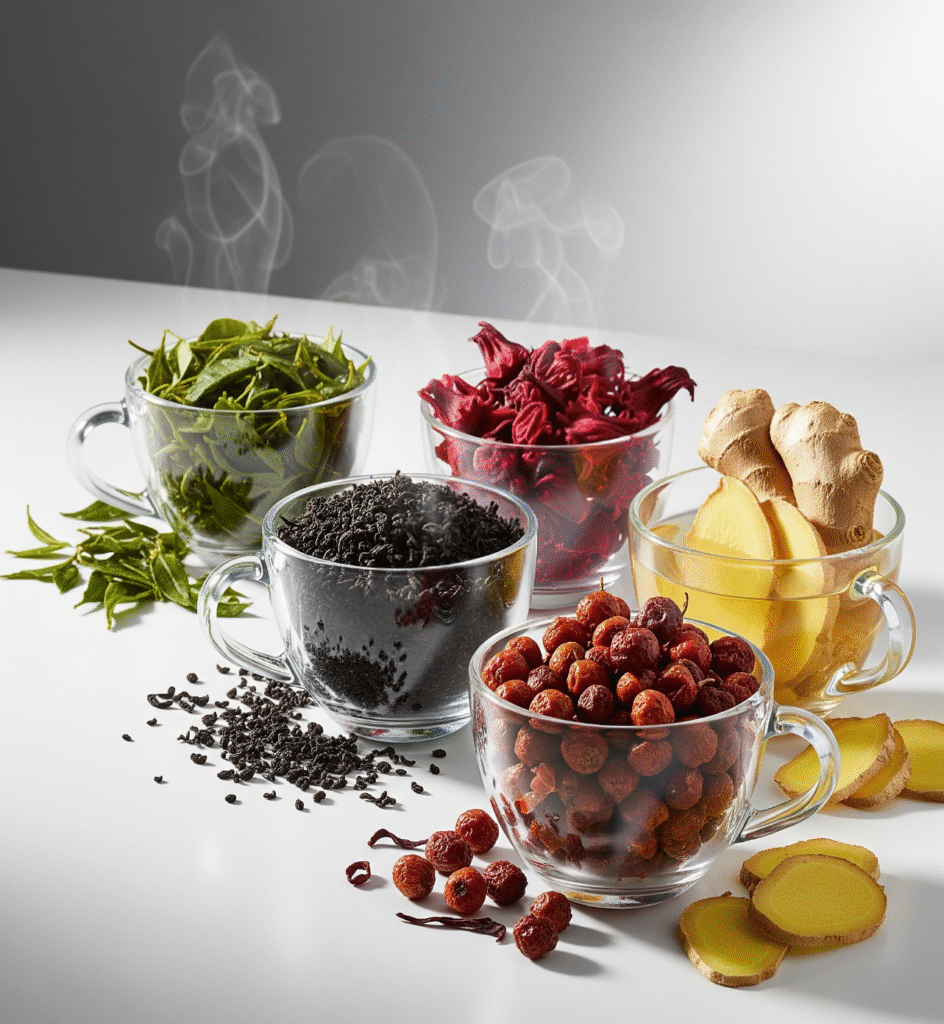Yeah, you heard it right!
“Heart-healthy tea recipes can be your delicious secret weapon for cardiovascular wellness. Discover how hibiscus tea lowers blood pressure, why green tea protects arteries, and which herbal blends reduce cholesterol naturally.
As we all know, from ancient times tea has always been like a ritual for every house on the earth, may be their tastes and combinations are different from each other but the soul of tea remains the same.
Tea is not consumed just for its scrumptious taste and wonderful aromas but in Ayurveda & other scientific researches it is found that tea can help to minimize heart problems.
Today here we talk about the relationship between tea & our heart. You will be amaze by knowing that Tea is extremely beneficial for heart.
Tea has been extensively studied for its potential benefits to heart health, with research suggesting that regular consumption of tea may help to reduce the risk of cardiovascular diseases. Tea, precisely green and black varieties, has been studied for its potential benefits in managing or reducing the risk of several heart-related conditions.
Based on current research: Below is the detail of the cardiovascular conditions that may be positively influenced by regular consumption of Tea –
1- Atherosclerosis (Plaque Buildup in Arteries)
The polyphenols in tea, especially epigallocatechin gallate (EGCG) in green tea, may help break down amyloid deposits in arterial plaques, reducing their size.
-Lab studies suggest EGCG binds to harmful proteins in plaques, though human trials are needed to confirm this effect.
2- Hypertension (High Blood Pressure)
Tea flavonoids improve endothelial function & reduce inflammation, which can lower blood pressure.
-A Mendelian random study found a 25% lower risk of hypertension with increased tea intake 6. Regular consumption is linked to reduce in systolic blood pressure
3- High Cholesterol and Dyslipidaemia
Black tea’s theaflavins reduce LDL (“bad”) cholesterol and triglycerides.
Green tea’s catechins slow HDL (“good”) cholesterol declines with age.
-Studies show 10–15% reductions in LDL cholesterol with black tea consumption
4- Heart Failure
Tea’s anti-inflammatory effects may improve cardiac function and reduce strain on the heart.
-Genetic studies associate tea intake with a 28% lower risk of heart failure, partly mediated by blood pressure control.
5- Ischemic Stroke
Flavonoids in tea improve blood vessel dilation and reduce clot formation.
-Regular tea drinkers have a 20–30% lower risk of stroke, per cohort studies.
6- Coronary Heart Disease (CHD) and Myocardial Infarction (Heart Attack)
Tea polyphenols reduce oxidative stress and improve lipid profiles, lowering CHD risk.
-Some analysis may tell that there is 11% lower myocardial infarction risk with 3 cups/day of tea.
So now as we clearly understand that tea has a very positive impact on our heart health, now we should definitely go through some best teas to protect and improve heart health.
Important point:- Avoid using milk as it may interrupt absorption of essential nutrients
Here are the best teas that support heart health backed by scientific research and expert recommendations-
Tea No. 1- Green Tea
- Benefits: Rich in catechins (EGCG), which reduce LDL cholesterol, lower blood pressure, and prevent plaque buildup in arteries.
- Evidence: Drinking 3-4 cups daily is helpful to 26% lower risk of heart disease and improved vascular function.
Tea No. 2- Black Tea
- Benefits: Black tea contains theaflavins, which improve blood vessel function and reduce LDL cholesterol by 8-11%.
- Evidence: Drinking 2-3 cups daily may lower stroke risk by 16%.
Tea No. 3- Hibiscus Tea
- Benefits: Lowers systolic blood pressure by relaxing blood vessels (anthocyanins) and reduces LDL cholesterol.
- Evidence: Studies show significant BP reduction with 2–3 cups daily intake.
Tea No. 4- Howthorn Berry Tea
- Benefits: Traditionally used to improve circulation, lower blood pressure, and reduce arterial stiffness.
- Evidence: A 2020 review found it effective for mild hypertension after 12 weeks of use .
Tea No. 5- Ginger Tea
- Benefit: Inhibits plaque formation in arteries (atherosclerosis) by preventing LDL oxidation.
- Evidence: A Chinese study with 4,628 participants found daily ginger consumption reduced hypertension risk by 8% and coronary heart disease by 13%.
Final Thought:
Tea isn’t just a flavourful ritual—it’s a powerful remedy for heart health, backed by centuries of tradition and modern science. Whether you prefer the antioxidant-rich green tea, the cholesterol-lowering power of black tea, or the blood pressure benefits of hibiscus, each cup offers a simple yet profound way to support your cardiovascular well-being.
But remember: No single drink can replace a heart-healthy lifestyle. Pair your daily tea with nutritious meals, regular movement, stress management, and medical guidance for the best results.
So, brew mindfully, sip joyfully, and let every cup be a small, delicious step toward a stronger, happier heart.
Your heart deserves this kind of love—one cup at a time. 💚🍵

